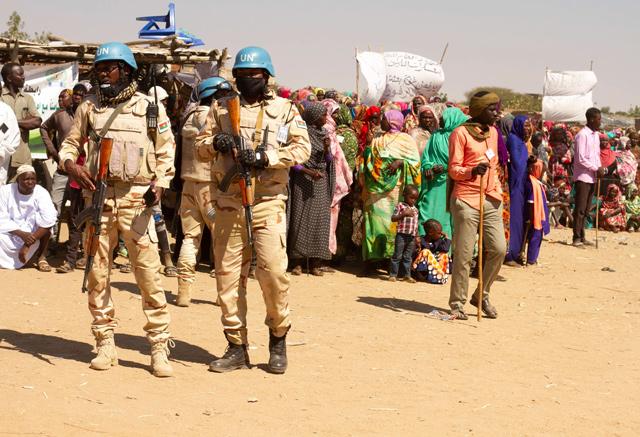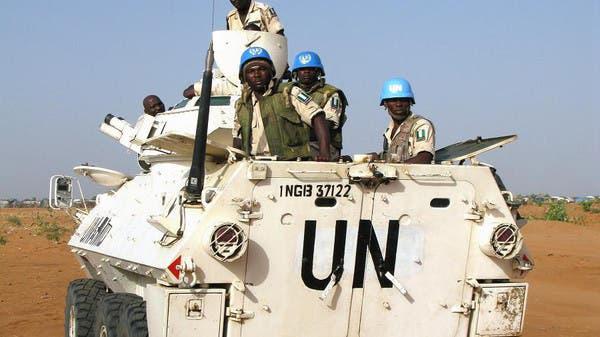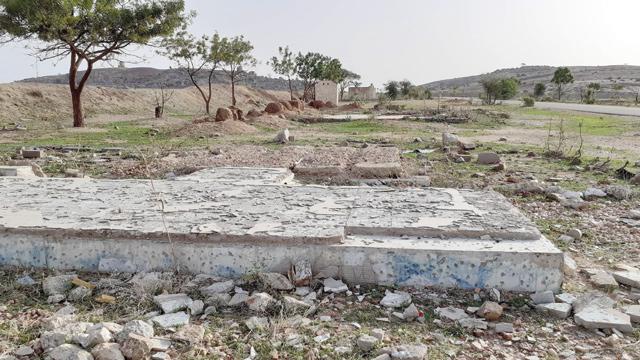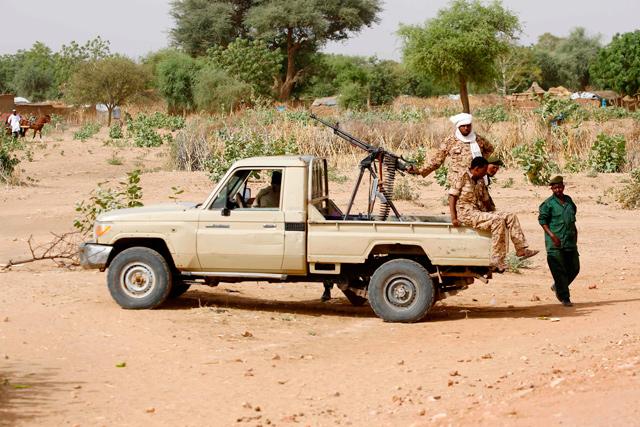You are here
Peace mission in Sudan’s Darfur ends, stoking fears of new clashes
By AFP - Jan 02,2021 - Last updated at Jan 02,2021

Members of the United Nations and African Union peacekeeping mission (UNAMID) look on as Sudanese internally displaced people stage a sit in to protest against the end of their mandate, in Kalma camp in Nyala, the capital of South Darfur, on Thursday (AFP photo)
KHARTOUM/NYALA, Sudan — The United Nations and African Union on Thursday ended a 13-year mission to keep the peace in the vast Sudanese region of Darfur, even as recent violent clashes leave residents fearful of renewed fighting.
Fighting erupted in Darfur in 2003, when ethnic minority rebels rose up against the Arab-dominated government in Khartoum, which responded by recruiting and arming notorious Arab-dominated militia known as the Janjaweed.
A total of 300,000 people were killed and 2.5 million displaced, according to the United Nations.
“The peacekeeping mission ended on Thursday December 31 at midnight in Darfur,” UNAMID’s spokesman Ashraf Eissa said.
“As of 1 January 2021, UNAMID’s troops and police personnel will focus on providing security for the mission’s drawdown activities, personnel, and assets.”
He said the phased withdrawal of the mission’s approximately 8,000 armed and civilian personnel will be completed inside six months.
The Sudanese government “will take over responsibility for the protection of civilians in the area”, UNAMID said.
Darfur’s bitter conflict has largely subsided in recent years and longtime autocrat Omar Al Bashir — wanted by the International Criminal Court for genocide and other alleged crimes in the western region — was deposed last year.
But the country’s transitional government is fragile, and ethnic and tribal clashes still periodically flare, including clashes last week that left at least 15 people dead and dozens wounded.
Darfuris, many of whom remain in camps years after they fled their homes, have held protests in recent weeks against the mission’s imminent departure.
“The lives of Darfuri people are at stake, and the United Nations should reconsider its decision,” Mohamed Abdelrahman told AFP on Wednesday at Kalma camp in Nyala, the capital of South Darfur.
He is among hundreds who staged a sit-in outside the mission’s headquarters at the camp.
‘Big trouble’ ahead
Protesters held up banners reading: “We trust UN protection for IDPs [internally displaced people],” and “we reject UNAMID’s exit.”
Longtime Kalma resident Othman Abulkassem fears the troops’ departure signals “big trouble” for Darfuris, leaving them at risk of further violence.
UNAMID spokesman Ashraf Eissa sought to allay those fears.
“We understand the concerns of the Darfuri population especially IDPs and other vulnerable groups, but the situation has improved a great deal over the past few years,” Eissa told AFP.
“The responsibility now lies with the transitional government and the Sudanese people themselves to enhance peace and security in Darfur.”
A UN political mission — the United Nations Integrated Transition Assistance Mission in Sudan (UNITAMS) — will be installed in Darfur after UNAMID’s departure.
It will be tasked with assisting Sudan’s transition, peace-building, and aid disbursement.
Following last week’s clashes, Sudanese authorities said government troops will be deployed to the region to contain any violence.
On Thursday, acting foreign minister Omar Qamareddine said UNAMID “contributed to acheiving peace.”
“It’s true that its tenure was marred by some obstacles but it was, overall, good,” the minister told a Khartoum press conference, adding that the deployment of government troops across the region will be completed by March.
But many are sceptical.
“If the protection of internally displaced people is assigned to the government forces, it will be like handing Darfuris to the forces that committed massacres and rape against them,” said 25-year-old Darfuri Intisar Abdelhay.
Thousands of Janjaweed militiamen were incorporated into Sudan’s powerful paramilitary Rapid Support Forces, whose head Mohamed Hamdan Daglo is a key figure in the transitional government.
The Janjaweed stand accused by human rights groups of carrying out widespread killings and rapes as part of a broader campaign of “ethnic cleasing” in the early years of the conflict.
Bashir was deposed by the army in April last year following unprecedented mass protests against his iron-fisted rule.
In August 2019, the military rulers who ousted him agreed a precarious power sharing transition with civilians.
The transition government has pushed to build peace with rebel groups in all three of Sudan’s main conflict zones, including Darfur.
But two rebel groups refused to join the deal, including the Sudan Liberation Movement faction led by Abdelwahid Nour, which is believed to maintain considerable support in Darfur.
Clashes still flare in the region over land and access to water, mainly pitting nomadic Arab pastoralists against settled farmers from non-Arab ethnic groups.
“There is not yet full and comprehensive peace in Sudan,” said Kalma resident Mohamed Hassan.
“And until there is, we are against the end of the UNAMID mission.”
Related Articles
UNITED NATIONS, United States — The United Nations Security Council has agreed to end the UN and African Union’s long-running peacekeeping m
NYALA, Sudan — A peacekeeping force this week completed its withdrawal from Sudan’s war-ravaged Darfur region, but security fears have been
KHARTOUM, Sudan — Over 80 people have been killed in two days of ongoing clashes in Sudan's restive Darfur, doctors said Sunday, just over t


















